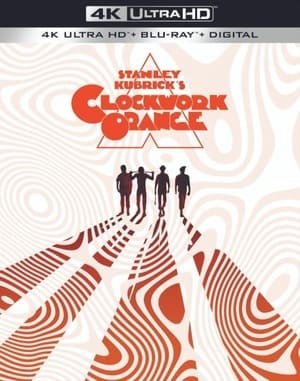The film made an exhaustive analysis of the causes of crime among young people, intolerance of the new generation to the usual moral values and life foundations of modern society.
The ruthless leader of a gang of teenagers who commit murders and rapes goes to jail and undergoes special treatment to suppress the subconscious desire for violence. But life outside the gates of the prison is such that the measures taken to “correct the cruelty of character” can not change anything.
4k movies reviews
Before moving on to ‘debriefing’, I will immediately dispel the most important misconception about the Kubrick film. Most viewers naively believe that ‘A Clockwork Orange’ is a film about the cult of violence and cruelty among young people. Forget about it. A Clockwork Orange is a political drama about the destruction of basic social institutions.
Unlike Burgess, who concentrated on describing violence in his book, Kubrick went much further. He not only shows the effect (acts of violence), but looks for the reasons, finds them and, most importantly, points to the methods of solving social problems.
If you will allow me, I will analyze the film by scene. Naturally, I take only the most key moments, without which it is impossible to understand the essence of what is happening. So:
Scene 1.
Opening scene in which a gang of juvenile delinquents brutally beat a bum. Kubrick, through the mouth of an old man, sets out the problem of the whole film: ‘How can a world be happy in which children do not respect their parents and in which so many iniquities are going on …’
This is the plot. Throughout the film, Kubrick explains how, why and at what moments children turn off on a slippery slope, why they grow up to be criminals, whether it can be prevented and what role they play in the embarrassment of society, the 3 whales of the modern world – the Church, Power and the Press.
Scene 2.
A conversation between the mother and father of the protagonist. Only 2 phrases from their dialogue are important:
– Where does he work in the evenings?
– I do not know…
Doesn’t that already explain why children don’t respect their parents? Kubrick recommends: take care of your offspring; ask where they are, with whom, in what company; try to show children that you care about their problems. And in general, is it worth having children if you do not have time to raise them?
Scene 3.
Hypocrisy of the Church. In the prison hall, the priest reads to the prisoners a terrible sermon about the hellish torments and sufferings that await sinners after death. They do not listen to his sermon, after which the priest begins to sing.
Meaning: how can you threaten the “fire of hell” to those people who already live in hell, and even count that they will take the true path and be merciful ?! What feelings can this delirium arouse in people other than disgust?
Kubrick also wanted to say that the ministers of the Church themselves are carried away by the form of their religion and do not see its content. Is the meaning of Christianity in heaven and hell, in torments after death and eternal life? No! The meaning is in faith, love and compassion, and it is these principles that the Church should convey to her flock, and it is with such a sermon that she awakens bright feelings in lost souls.
Scene 4.
Just one phrase: ‘When a person is unable to CHOOSE, he ceases to be a human’ (and turns into an animal, a murder weapon, a soulless machine, an obedient zombie, etc.).
I will not explain anything here – just look around, look at the news bulletins, government policy; understand why you work, live in a family, etc. Do you notice any trends?
Scene 5.
The hero returns to his family from prison without warning his parents. He is not welcome – there is a new tenant in the house, who paid for a month in advance and who became the old people ‘almost like a native’. The hero is forced to leave home and go wherever they look.
The bottom line: This story is the complete antonym of the biblical parable of the prodigal son. At Kubrick’s, parents kick their son out because of money and a bourgeois dream of peace. A classic example of hypocrisy.
And the last thing. Pay attention to the words with which the hero of McDowell addresses the audience throughout the film – ‘You are my brothers …’ Can’t you hear Kubrick’s bitter sarcasm? After all, this word ‘brothers’ just means that we are ALL – hypocrites, liars and shameless bigots. There is so much evil going on in the world – did you lift a finger to make it smaller? Indeed, at the very moment when you read these lines and spend your money on the Internet, in some Africa a beggar and a sick child is dying of hunger. With this money you could buy him a piece of bread and save him from death. But you don’t and, alas, you won’t. Do you know why? See Kubrick – he knows …
Info Blu-ray
Video
Codec: HEVC / H.265 (49.8 Mb/s)
Resolution: Native 4K (2160p)
HDR: HDR10
Aspect ratio: 1.66:1
Original aspect ratio: 1.66:1
Audio
English: DTS-HD Master Audio 5.1 (48kHz, 24-bit)
English: Dolby Digital Mono
French: Dolby Digital 5.1
German: Dolby Digital 5.1
Italian: Dolby Digital 5.1
Spanish: Dolby Digital 5.1
Spanish: Dolby Digital 5.1
Polish: Dolby Digital 2.0
English: Dolby Digital 2.0
Subtitles
English SDH, French, Spanish, German, Italian, Mandarin (Simplified), Mandarin (Traditional), Korean, Czech, Dutch, Danish, Finnish, Hungarian, Norwegian, Polish, Swedish, Japanese.

